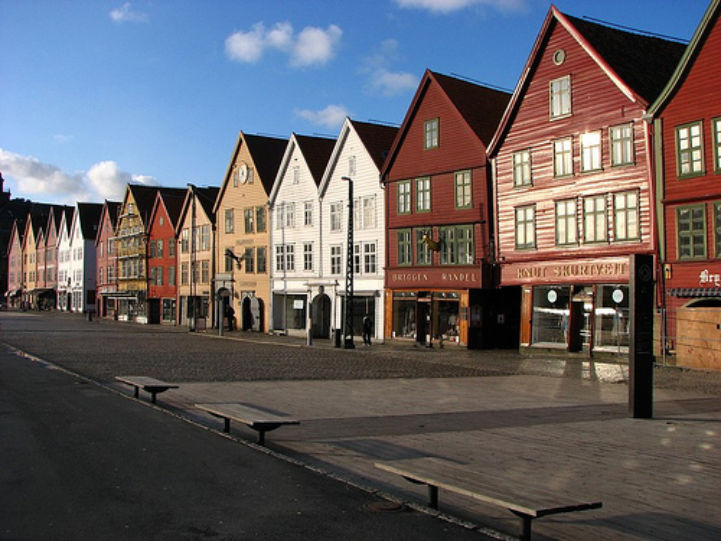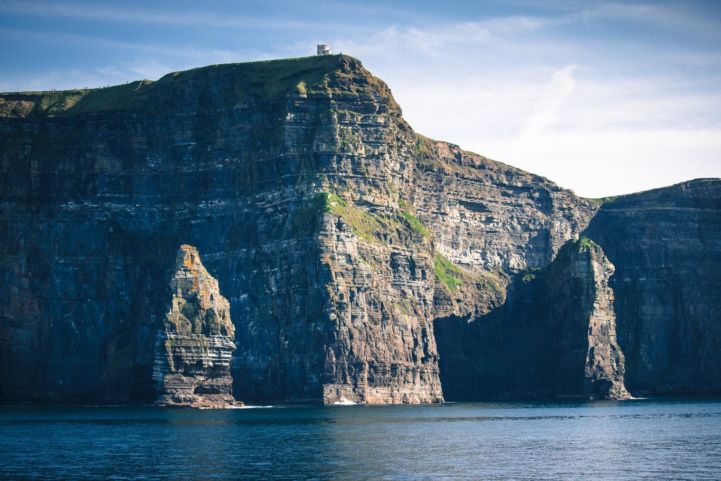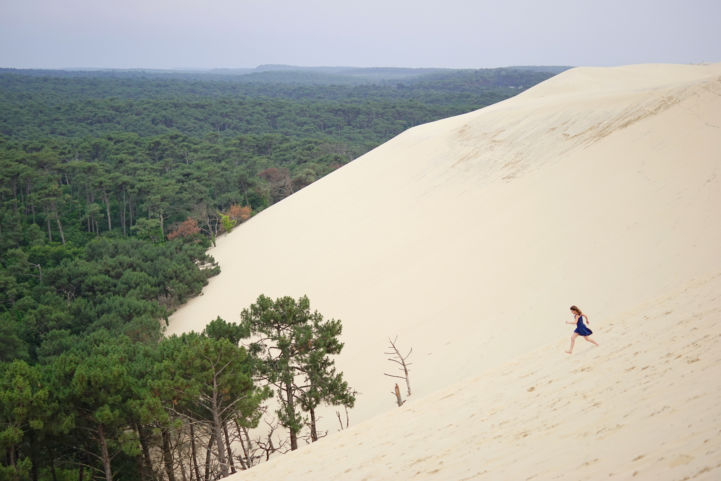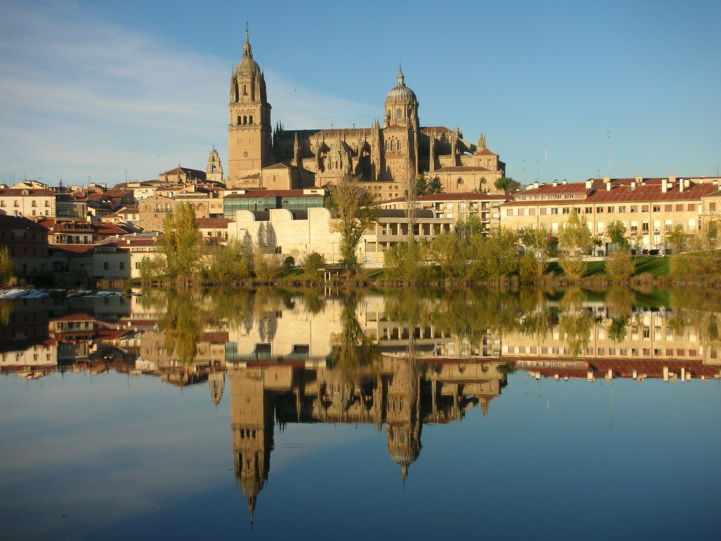14 UNESCO World Heritage Sites and many more incredible landmarks to discover on the Atlantic Coast Route
Winter slumber is finally coming to an end! With the springtime season around the corner, cycling on EuroVelo 1 – Atlantic Coast Route is a perfect way to experience, enjoy and get familiar with the astonishing cultural and natural landmarks dotted along this route. The mythical Giant’s Causeway on the coast of Northern Ireland, the architectural marvel that is Lisbon’s Belem Tower, the University of Salamanca, ‘’one of the four leading lights in the world’’ as described in medieval times, the spiritual and natural beauty of Sceilg Mhichíl in the westernmost parts of Ireland, the quaint charms of Bergen in Norway – these are just some of the wonderful UNESCO World Heritage Sites waiting to be visited by eager travellers. To get a taste of what is to come we have shortlisted four 'must-sees' along the route (but don't forget there is so much else to discover too!)
Bryggen in Norway== By starting your trip in the North, one of your first target destinations should be Bryggen, the old wharf of Bergen. It is a reminder of the town’s prominence as part of the Hanseatic League’s trading empire from the 14th to the mid-16th century. The beautiful wooden buildings that overlook the bay of Vågen remain one of Bergen’s central meeting points to this day. The area dates back to 1070 when the city was founded by King Olaf III, known as Olav Kyrre. Around 1200, Bergen became an economical and administrative hub in Norway, with Bryggen as an increasing important centre of trade.

The area has had several fires throughout history – the last one in 1955 – but Bryggen has been protected locally since 1927, and it is still possible to sense the historical vibe as you pass along the slightly leaning buildings. Bryggen in Bergen was the first Norwegian site to be listed by UNESCO, back in 1979. Other fascinating sites to visit in Norway are Vegaøyan, the dramatic Vega Archipelago just south of the Arctic Circle; the 6,000 year old rock art in Alta; and the West Norwegian Fjords, Geirangerfjord and Nærøyfjord.
O'Brien's Tower in Ireland
Travelling further to the west, your journey takes you to Ireland. Here you will find the O’Brien’s Tower, which marks the highest point of the Cliffs of Moher, a very popular tourist destination in County Clare. It is located a short distance from the villages Doolin and Liscannor. The three-story castellated observation tower is built of grey stone and is situated in open surroundings. It has been fully restored after months of conservation work. Visitors can use the tower's top floor viewing platform for long reaching views over the bay and out towards the Twelve Bens mountain range: also known as the Twelve Pins, in Connemara, Loop Head at the southern tip of County Clare and the Aran Islands to the west.

The castle also has a gift shop and a gallery for local artists on the first floor. Visitors to the tower can also take in the 'Cliffs of Moher Visitor Experience' which is built into the hillside nearby and learn about the geology, flora and fauna of the area including some of the oldest rocks at the bottom of the cliffs where a channel has been cut by a river 300 million years old. If you decide to leave the mainland behind you can also travel out to the beautiful and spiritual Skellig Rocks – a UNESCO World Heritage Site (and Star Wars filming location!).
Pilat dune in France
As you make your way down South, the road will take you to the Grande Dune du Pilat - the tallest sand dune in Europe. It is located in La Teste-de-Buch in the Arcachon Bay area, 60 km southwest of Bordeaux, France. Although the Pilat dune is not officially registered as UNESCO World Heritage Site, it is nonetheless one of the most fascinating and striking natural landmarks on the Atlantic Coast Route. You can enjoy the majestic view of the Atlantic with dolphins and porpoises, and also the forest gradually overtaken by the sand. An optimal period to visit this wonderous site is from April to October, when the weather conditions are most suitable.

Due to its exposed location along the sea and steep angle, the Pilat dune is a famous paragliding spot with great soaring conditions. Also, the parking is free for bicycles. Close by is also the charming port city of Bordeaux which should definitely be on the list of places to visit and to enjoy some of the world’s finest wines. If you are fascinated by Mesolithic monuments and prehistory, the Carnac stones are the perfect site to visit further to the north in Brittany.
Salamanca in Spain
At this point of your journey, the warm South welcomes you as you make your way to the cosmopolitan city of Salmanca - Ciudad Dorada (gilded city), a stone campus, a pupil's outdoor blackboard and the birthplace of the flamboyant form of architecture known as Plateresque ('in the manner of a silversmith'). The Plaza Mayor (Main Square) is a prime example of plateresque architecture and the most famous writers of the golden age named it the most beautiful city of all. The El Cielo (sky) ceiling frescos of the university symbolize the city's international reputation. Furthermore, still in the region of Castile and León you can discover the city of Burgos where you shall find further inspiring UNESCO World Heritage Sites: Burgos Cathedral, the Archaeological Site of Atapuerca and, of course, the Pilgrim’s Way to Santiago (for which you you can follow EuroVelo 3 - Pilgrims Route). The route of EuroVelo 1- Atlantic Coast Route meanwhile takes another ancient commercial path - the Ruta Vía de la Plata - ( from Gijón to Sevilla). This leads to Portugal and more UNESCO World Heritage Sites, such as the Fort of Sagres, Belem Tower and Historic Centre of Oporto and Luiz I Bridge.

As you can see, there are many wonders awaiting you along the Atlantic Coast Route. So, get your trusty bicycle ready and start planning an amazing spring adventure!